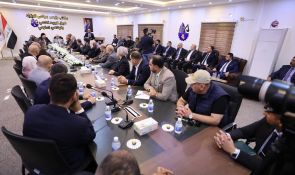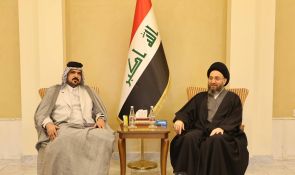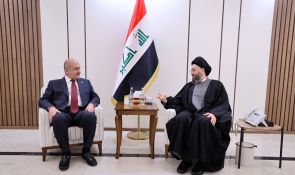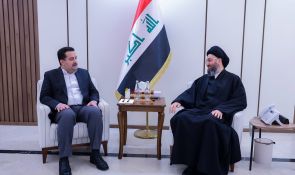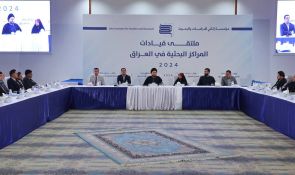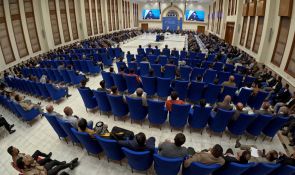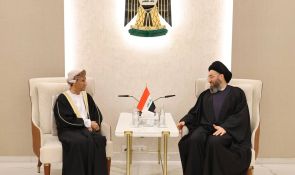FORCES: THE ONLY VENUE TO DISCUSS CRISES, RESOLVE PROBLEMS AMONG POLITICAL FORCES AND CALM DOWN THE IRAQI FIELD…
We noticed during the few past days many meetings among the political leaders, bilateral, 5-party meetings and other meetings among a number of forces in Baghdad, Arbil and other areas of Iraq. The goal behind all these meetings, as was announced, was to study the present political crisis in the country, find solutions and treatments for this crisis and prepare for the success of the national forum so we may be before a clear vision acceptable to the political leaderships, one that helps resolve the crisis, even the present political complex in the country. We renew our welcome and support for every such meeting and every such step that calms the political situations in the country down and finds solutions and treatments for the successive crises in our homeland so we may go back to harmony, love, cooperation, resolution of problems and enhancing trust. We once more stress that dialogue and understanding among the political forces is the only venue to discuss these crises, resolve the problems among the political forces and calm down the Iraqi field in preparation to build, repair and cooperate for serving the citizens. There is no alternative to dialogue and understanding among the groups in order to resolve the present problems. As long as we live the political and democratic plurality, we will live the many visions and readings in our homeland, and there will be those who have an opinion while others have another opinion. There is no way to unite the visions and allay the tensions except through truthful and constructive dialogue with sincere intentions. When everyone assembles at the dialogue table and deal with their problems, we must not worry about any sincere dialogue which some groups and leaderships try to allay the tensions and resolve the country’s outstanding problems. Such a dialogue and table that gets the political contenders together ensures safeguarding and enhancing Iraq’s unity and safeguards the future of this good country. It strengthens the trust among the political groups and gives them assurances, providing environments for the political stability. We badly need political stability so we may build, repair and achieve prosperity for the good citizen.
Success of dialogues and understandings lies in four matters; otherwise, we will witness more escalations and complications:
1. These dialogues must have a deep and comprehensive strategic outlook for solving the country’s problems, for the anticipated and desired solutions. We cannot achieve a true solution for our Iraqi reality without reaching this comprehensive vision that wins the consensus of the Iraqis, one that takes note of all standpoints, obsessions and fears of various Iraqi groups. We cannot reach the anticipated national harmony except through a strategic and comprehensive vision.
2. We must build on a commitment to carry out the undertaken decisions and pledges. If the leaders sit at the table, hold a dialogue, pledge to undertake certain measures, then they lag behind them…, there will be no chance left for true trust among these groups, and matters will be more difficult. One must honor his word: He must either make a promise then fulfill his obligations towards others or not make one. We must build trust. If the political leaders enter into a dialogue while having in advance decided to hold one, it will then be said that they sat down for it, but there was no real desire to seek a resolution; the matters will not be resolved then. We need to build on commitment on our agreements so we may strengthen the trust among the groups. This requires putting in place true guarantees that assure everyone that their agreement is liable for implementation within short and pre-set deadlines.
3. We must go to the solutions and avoid making deals. A big difference exists between solutions and deals. Solutions mean identifying the problem and determining the group or groups that are harmed in a certain issue or political crisis and putting the treatments that ensure serving the country’s public interests and strengthening political stability. This is what is called a solution. These rights fall within the frames of rights of all Iraqis, demands submitted by all members of the Iraqi nation. You take what belongs to you and nothing else, but also no more: neither more nor less. If you take more than your right, it means that what you took belongs to someone else. If you take less than your right, it means that someone else took what belongs to you. We, therefore, need solutions. As for deals, they mean trivialities between two groups or more under the table. Commitments are based on interests of both groups that have entered in a deal and not the public interests. We, therefore, declare our support for all solutions and reservations about all deals done without the knowledge of the Iraqi people and are done for special reasons that are distant from the interests of the Iraqi citizens.
4. the success conditions in these understandings are: clarity, transparency and the knowledge of them of the public opinion, that of the citizens of the Iraqi people, of the various agreements among the leaders. Whenever an agreement is made, the public must get to hear about it. When there are secret papers signed and exchanged by the parties to an agreement, there will be many question marks in the Iraqi street about the reasons that call for secrecy regarding the commitments the parties exchange among them. If they are public interests, and if they are right, why should they be hidden from the people? But if they are matters that are against the common interests, who authorized anyone to give the people’s interests to others in unknown deals and in matters that are not clear to the eyes and to the members of the Iraqi people? This is what we notice when the crises among the groups intensify whenever a crisis takes place between two groups, whenever some people make threats that they would reveal the cards and the agreements that were reached with others. This by itself reveals that what was signed contains matters that embarrass these officials before the people. If they do not embarrass them, why do the people not know about them? Why are there hints and threats made? These hints reveal that some of these agreements are not accepted by the citizens; therefore, they were hidden from them distantly from the lights. This is what we have recently heard about from representatives of the supreme authorities when it was articulated clearly in a way that revealed the fact that on the basis of these political agreements the respectful government set out to be formed in the past months. We have to avoid such covert agreements and deal with clarity and transparency before our people and say to them: This is what we have agreed about, and it serves the interests. If something runs to the contrary of [public] interests, it must not be accepted by us, and we do not endorse it. If it falls within these interests, we must not fear it. We must demonstrate it before everyone to see so the citizens of the Iraqi people may become familiar with the nature of these agreements.
The national forum represents a basic challenge and a true test of the political forces so they may express their seriousness, true will and desire for a dialogue in order to solve the problems as a service to the homeland and the citizen.
Adhering to these four conditions will mean that we eliminate the crises, mitigate sentiments, calm the Iraqi field and promote more trust in the Iraqi street in the respectful officials and in the political forces. Without it, if these conditions are violated, it will mean that we hatch crises. It will mean more crises, one after the other. We must work towards eliminating, not hatching, crises so we may be before a better reality for our citizens. We stress and emphasize that the price of these crises is paid by the Iraqi citizen, whether in his security or service or livelihood reality. He pays the big price when these crises escalate. When there is harmony, stability and calm, the Iraqi citizen will benefit, the wheel of reconstruction goes forward, and everyone pays attention to serving the citizen and not stay busy with political feuds. The national forum represents a basic challenge and a true test of the political forces to express the extent of their seriousness, true will and desire to hold a dialogue and to solve the problems among us in order to serve the homeland and the citizen. If this national forum is able to put the dots on the letters and determine a clear, realistic, transparent and convincing vision for the Iraqi street that assures the political forces, this means that we are now on the right tracks along the path of solution, of dealing with our problems. If we exert our all in implementing our agreement in this national forum, it will mean that we are going along the right path towards solving the problems and returning to the true cooperation that makes all the political forces one single work team serving the homeland and the citizen. If we procrastinate in holding this national forum or if we hold it without coming out with a clear result, this will lead more escalation, to going to the unknown, God forbid.
A good call launched by the Fayha satellite channel drew our attention for airing this national forum directly so the Iraqi citizens may become familiar with what goes on in the politicians’ lobbies, how they deal with each other, the level of seriousness of the political leaderships to solve the problems and to serve the public. As an Iraqi citizen, I strongly support this initiative which came to express a development in our national media in its intellectual dimension, in addition to the technological development our news media are witnessing. Also, emphasis must be placed on the true media is not the one that only disseminates and interacts with reports; rather, it is the media that takes part with the event, leaving its marks on the event. Such initiatives can leave such an impact. It is important that we hear about true and serious initiatives, and that we support and encourage such initiatives regardless of whether the politicians will accept or reject them. The news media cannot force the politicians to adopt their initiative, but they are able to enlighten the public opinion and provide the right culture that set for our citizens and politicians what is best for them to adopt and to act upon.
Positive relations between Iraq and Kuwait can serve as a model for a positive relationship between Iraq and the Gulf countries.
We monitored with interest the meetings of the joint Iraqi-Kuwaiti committee, and we were pleased with the positive evaluation released by both committees, or by either Iraqi or Kuwaiti delegation. The evaluation for these meetings and relations has been positive. The positive relations between Iraq and Kuwait and the solving of the outstanding problems between both countries can be a model for a positive relationship between Iraq and the good Arab Gulf countries. There are many outstanding dossiers between Iraq and these countries. The meetings between both countries, the seriousness of both of these committees, the true seriousness of both sides, the constructive dialogue and the sincere intention are the four elements which, if they continue, will let us see a true solving of many problems. Outstanding dossiers will one after the other be folded, and the doubts planted by years of cold shoulders and policies of the past regime between both brotherly countries will be put to rest. The joint interests that bring both of these countries together are by far greater than the differences and outstanding issues between them. We hope the brothers in Kuwait will help Iraq get out of Chapter Seven and help the Iraqis restore their full sovereignty. We also hope that our brothers in Kuwait will participate in assisting in dealing with the debts and outstanding reparations, for the common interests and economic benefits between both countries are much greater than these debts, reparations and the like. Iraq can improve its relations with all countries of the region and the world if there is a real will, a constructive dialogue and a sincere intention by Iraq and by these countries, and if they meet at the dialogue table and resolve their problems. Today’s Iraq is one of openness. It is an Iraq that looks for the joint interests and mutual respect with these countries, in the vanguard of which are the brotherly Arab and Islamic countries.
I call on the parliament to amend the law bill relevant to the rations card, its type and those entitled to it…
The subject of the rations card is an endless issue. The Iraqis have now had a long history with the issue of the rations card. The laws have changed, yet the rations card and its problems are yet to change. What is odd is that the rations card is used by other nations and countries to regulate the process of food distribution when a nation is in war conditions or in crises. But for it to turn into a process in the people’s normal life, this is a unique phenomenon in the region. But the rations card has become part of the life of the Iraqi citizens, and it is a subject that calls for continuous annoyance for the citizens because of many problems and procrastinations that take place in it. It is strange how the rations card becomes a part of documents required for processing matters and in governmental administrative transactions and even in non-governmental ones. This has turned it into a national document that stresses the citizens’ being Iraqis, and this is quite amazing. Hardly any transaction is processed without the submission of the rations card up to opening a bank account, registering a son at a school, or joining a public course. In any case, it is said: bring us a copy of the rations card. What is unusual here is that there are more than two million Iraqis who are living in exile or work abroad, and these return home and have transactions. Their transactions are not processed except if they submit the rations card which they do not need. Two million émigrés are forced to get this document issued for them and, ultimately, a rations share is set aside for them. They leave the country and they do not need this card or this share, so they give it to their friends and relatives because it is imposed on them. What justice is this and what wisdom is served in this situation? A third of the Iraqi citizens are under the poverty line and are in need of a double share, and an improved share, of the rations card, yet it is not given to them while it is being spent on two million expatriate émigrés who are well-to-do at home and their number may not be large. Thus, the share is given to those who do not need it, whereas the improved level of it is being kept from those who need it. Had it been kept from those who do not need it, then it is improved and its items increased in number for those who need it from among the indigents and limited income people, we will have scored success and provided a complete share without exhausting the budget of the Iraqi State with additional budgets. This is hard but is not impossible. It requires bypassing the killing routine and requires thinking with means that serve the citizens and facilitate their lives. I call on the ladies and gentlemen members of the parliament to look into this sensitive and important dossier and to amend the law bill relevant to the rations card’s quality and those who are entitled to receive it, etc., so we may provide a complete and improved share in these same budgets without exhausting the State budget and without the poor and the needy being deprived of a full share. We have to distance ourselves from atmospheres of suspicious haggling which have for so long been mentioned in addition to the big corruption suspicions about which we now hear a good deal in the media and in the parliament relevantly to the rations card, to the way it is provided and distributed to the citizens.
Pre-Elementary School Education: an important foundation and requires creating a directorate in the ministry of education specialized in early education affairs.
Early education, I mean pre-elementary schools, represents an important foundation on which the elementary, preparatory and university education are built. If the foundation is solid, the study in the next stages will be strong and solid. And if the foundation is weak, the results will be weak, too, and stumbling. There are 41% in the international averages occupied by pre-elementary school children who join kindergartens and learn at an early age. In the region, the percentage of those who learn is 18%, but in Iraq, the early education dips to only 7%, and 10% of this modest figure covers the countryside and rural areas and 90% in urban areas. This means that there is an acute shortage in the early education issue and this needs true treatments. All of this is according to UNESCO and UNICEF statistics, these two international organizations that deal with the Iraqi ministry of education in order to improve this reality. We need a broad awareness and public education in order to prompt our children to learn at an early phase of their lives. There is a need for measures to be undertaken by the ministry of education to take care of this broad and big slice. This requires the creation of a directorate in the ministry of education specialized in early education affairs.
The lands of which we were deprived as a result of the presence of land mines are agricultural and some of them have oil… There has to be a national strategy to remove the land mines…
According to United Nations reports, Iraq has more land mines and military waste than any other country in the world. There are more than 30 million land mines covering 1,730 square kilo meters a third of which is located in Basra and the other two-thirds in other areas. The largest portion of them is in the “Asimat al-Khair”. This leaves a serious impact on 21% of the Iraqi population. We regret to say that 90% of these lands, of which we have been deprived as a result of the presence of mines, is agricultural and some of them have oil. This leaves an impact on the agricultural and oil realities in the country. These are terrifying figures that express the seriousness of this subject and the need for a quick treatment for it. This cannot take place except through a national strategy to remove the land mines. We thank and appreciate the efforts of the government entities that have expressed interest in this subject and are now planning to put together this strategy, perhaps we will se a mine-free Iraq in the near future.
Improving the Status of Labor in Iraq…
On the first of May, we celebrate the International Labor Day. Iraq’s workers celebrated their day quietly as has been the case with their factories and manufactures for many years. At the time when we salute the Iraqi workers and labor in the world on this international day, we demand many matters in order to improve the status of labor in Iraq:
1. We need the re-coining of the labor law in a fair way so it may be fair to the workers and their quite often wasted rights.
2. The legislated law must be re-considered. It was legislated during the past regime. It turns the workers into employees and prevents them from setting up their unions to defend their rights and issues following policies which were kept during the past regime and dissolved with the fall of that regime, and in order to build the democratic reality in Iraq.
3. We need a legislation that regulates workers’ union work and distances it from the atmospheres of bickering, politicizing and attempts by labor unions to take advantage of these unions to serve political groups here or there.
4. There is a need to change the daily wages and contracts into permanent employment so the workers may feel that their rights, future and their families’ future are all secured.
5. There is a need to cover the workers with health and social security.
6. We demand the return of factories to work according to the modern techniques which will help develop the status of industry in Iraq.
7. There is a need to protect the national product from flooding the market with imported goods which greatly affects our national products.
8. There must be backing of the industrial and production sector in Iraq through legislations, techniques and suitable government measures.
9. The Industrial Bank must be reactivated. It enables owners of factories to obtain easy loans to develop their factories or build new ones.
The meeting of the general secretariat of the Union of Arab Writers and Scholars in Baghdad: An important opportunity for Iraq to return to the cultural field and Arab literary creativity in a broad way…
We have felt a great happiness at the decision by the General secretariat of the Union of Arab Writers and Scholars for holding its next meeting in Baghdad following a boycott that lasted for many years. This reveals a new reality lived by the cultural and creative circumstance lived in Iraq in the shade of the development which Iraq is witnessing. It is an important opportunity for Iraq to return to the cultural field and to the Arab literary creativity in a broad way. We hope the Union of Iraqi Scholars and writers will invest this opportunity. The professionalism and competence we know about them qualify them to shine and to invest this event for a greater role which the Iraqi cultural field witnesses and a broader impact on the Arab cultural field. We also support the Iraqi unions and leagues as they revitalize their Arab, regional and global role, and we hope these leagues and unions will carry Iraq’s message to the whole world.


